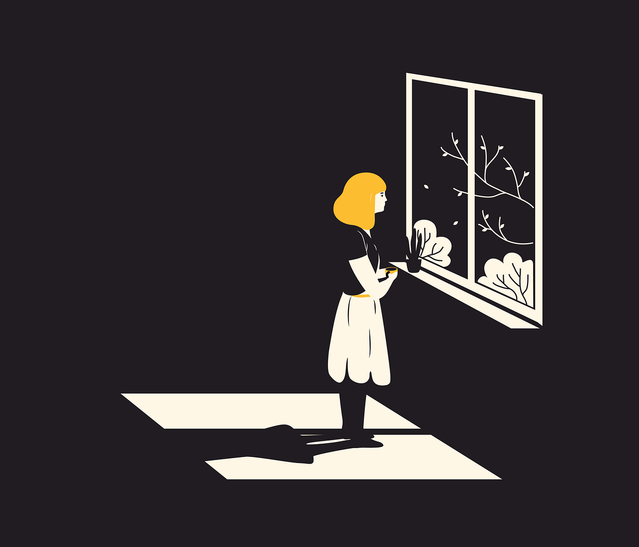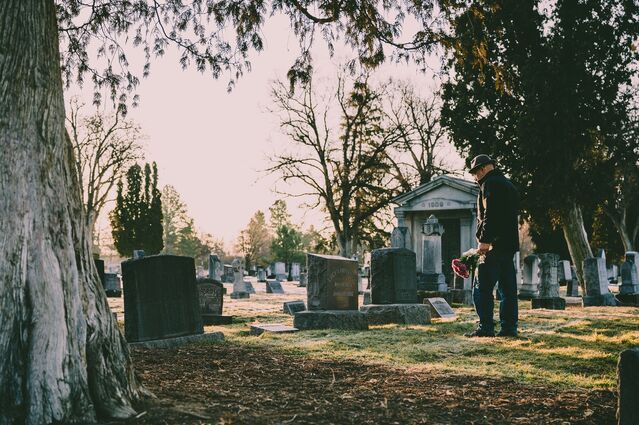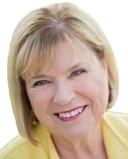Depression
Depression, Anxiety—or Anniversary Reaction?
Anniversary reactions can look like depression, but should be treated as grief.
Posted June 1, 2021 Reviewed by Jessica Schrader
Key points
- Although COVID-19 surges are decreasing, there may be a surge of unexpected emotions.
- Anniversary reactions may masquerade as depression.
- Those experiencing an anniversary reaction about a death may want to create a ritual to replace the loss of a funeral experience.

We are a year past the beginning of COVID-19 deaths and lockdowns, but does a new condition warrant our attention?
Given the magnitude of the losses suffered over the last year, and the new possibilities for social gatherings, it’s inevitable that, in the coming weeks and months, most of us will either experience an anniversary reaction or interact with someone who is grieving. But if we are going to heal from loss, we first must recognize it and not confuse it with anxiety or depression.
This May, Damen, a young accountant, initiated a telehealth session, saying, “I don’t know why I don’t feel like doing anything. But nothing is really wrong.” Although he is normally active, riding his indoor bicycle during 2020 shutdowns and making sure his group of friends regularly connected on video calls, he’d felt lethargic and sad for weeks and couldn’t understand it. “With tax season winding down, I should be ready to relax.”
As he described his confusion over his anhedonia, I recognized he was struggling precisely because spring was in the air. Around the same time last spring, just as Damen’s office was over-run with taxes to file, his father died of COVID-19. He and his family had not been able to be at his father’s bedside at the hospital.
Unable to have a traditional funeral, the family held an online memorial that left Damen feeling “unfinished.” Damen believed he’d moved on. He’d told me, “It’s not as if I’m the only person who grieved without a normal funeral process.”
But I didn’t think his malaise was about the funeral. Damen was re-experiencing grief in a way he did not recognize.
Unrecognized Anniversary Reactions Can Overwhelm People
Anniversary reactions—feeling grief at the same time of year that we initially experienced a loss—can overcome a person with emotions like sadness, irritation, and anger, and they can interfere with coping with a profound loss. The deaths of beloved family and friends can trigger powerful anniversary reactions. As those anniversaries arrive, many of us feel like we are losing our loved ones all over again.
Strong emotional reactions to these anniversaries can sneak up on a person in large part because they often surface subtly, outside of awareness, through environmental cues like the color of the light, the smell of the air, the time of evening dusk sets in, or even sounds and voices from programs on the television. These environmental triggers are deeply entwined in our memory and in the context of our loss. In Damen’s case, I recognized that the slant of the sun, the smell of blooming lilacs, and the pace of his work on taxes were sending him back to the emotions he felt when his father died.
“Let’s think back to a couple of months ago when you weren’t feeling this way,” I said to Damen. I asked him to recall the preceding weeks and pinpoint when his lack of interest in anything set in.
“It started when the weather changed,” he said. He immediately recognized that the time of year correlated with his father’s illness and death.
Once Damen understood he was experiencing an anniversary reaction—mourning, not depression—he was less confused by his mood and was able to talk about what he was experiencing.
If a therapist viewed Damen’s symptoms as depression, he or she might well give solutions for treating it: medication or cognitive interventions to raise energy and reframe negative thoughts. But grief requires a different process than depression: reflecting on the loss.
Damen needed to understand about an anniversary reaction to a death to resolve his lethargy.
It’s important to recognize anniversary reactions because, once people understand that they are re-experiencing grief as part of a common phenomenon, it becomes easier for them to stop labeling themselves as depressed or judging themselves as “weak” or “stuck.”
As we talked, Damen realized how much he loved his father and was a bit surprised at all the ways he missed him. I suggested that Damen find a way to honor the memory of his father. One of the most difficult parts of his grief came from an unfinished feeling from not being able to be with his father during his death and not being able to have a wake and funeral for him. Damen was missing the kinds of reminiscing and processing that would have happened during these customs. He had come to accept not being with his father at his death as a reality he could not undo, and he let go of any vestiges of guilt: it was out of his control. But he could replace the missing condolences and sharing of memories that would have occurred at a wake that would have brought some comfort when his father died. Now, at the anniversary of his father’s death, was a good time for Damen to connect with family members or close friends to discuss his father’s life. Damen contacted people to ask them to share a memory of his father, and in doing so, realized he wanted to do something more formal with family to celebrate his father’s life.
Since people are often at a loss of how to bring their grief into their community after the immediacy of the loss has passed, I brought up the notion that rituals at the time of death help families and friends share a sense of togetherness and help them feel less alone. Wakes, sitting shiva, funerals, and memorial services all do this. Once these opportunities are in the past, it is hard to recreate that communal sharing. It was likely that Damen could create the feeling of community and togetherness if he reached out to people who knew his dad. Contact with his father’s friends helped Damen realize that he not only shared a loss but shared a memory full of love with his community.
To anchor the supported sentiments he was now feeling, Damen asked his sister to join him in creating a ritual to mark the anniversary of their father’s death. They each wrote about their positive memories of their father and met at his gravesite to read them to each other. Finally, they were able to share their sense of loss and remembrance in person. They left their messages of love wrapped around flowers they left at the site.

How Can You Tell If You Are Experiencing an Anniversary Reaction and What Do You Do About It?
If you are affected by feelings of sadness, lethargy, and loss of interest that do not seem connected to your current situation, ask yourself the following:
-
Are these familiar feelings? Have I had them for months (or longer)? Is there a good situational reason why I have them? (Such as if you are going through a current difficult event or recently lost someone to death.)
If they have appeared without a clear reason and you do not have a history of being depressed, follow the path I asked Damen to take: Go back in time to retrace what happened as your mood changed.
- When was the last time you felt good, or even OK?
- What was happening around you when you noticed your loss of energy or enthusiasm?
- Note the connection to any specific event, interaction with another, or time of year (season or holiday, etc.).
- Write, draw, or play music that will help to remember your lost one with love, even if you had a funeral at the time of death.
- Consider creating a ritual to replace the loss of a funeral experience. Ask friends to share a remembrance meal, read your memories to each other, look at pictures of times you spent with your loved one, or come up with other ideas that connect you to people who also loved your lost one.
- What was happening around you when you noticed your loss of energy or enthusiasm?
- Note the connection to any specific event, interaction with another, or time of year (season or holiday, etc.).
These are but a few of the ways you can heal an anniversary reaction. Be ready to recognize the feeling if it shows up again next year.
For more on this topic, you can read my ebook, Pandemic Anxiety: Fear, Stress and Loss in Traumatic Times, and look for my next posts on anniversary reactions to other kinds of loss and post-pandemic re-entry anxiety.




